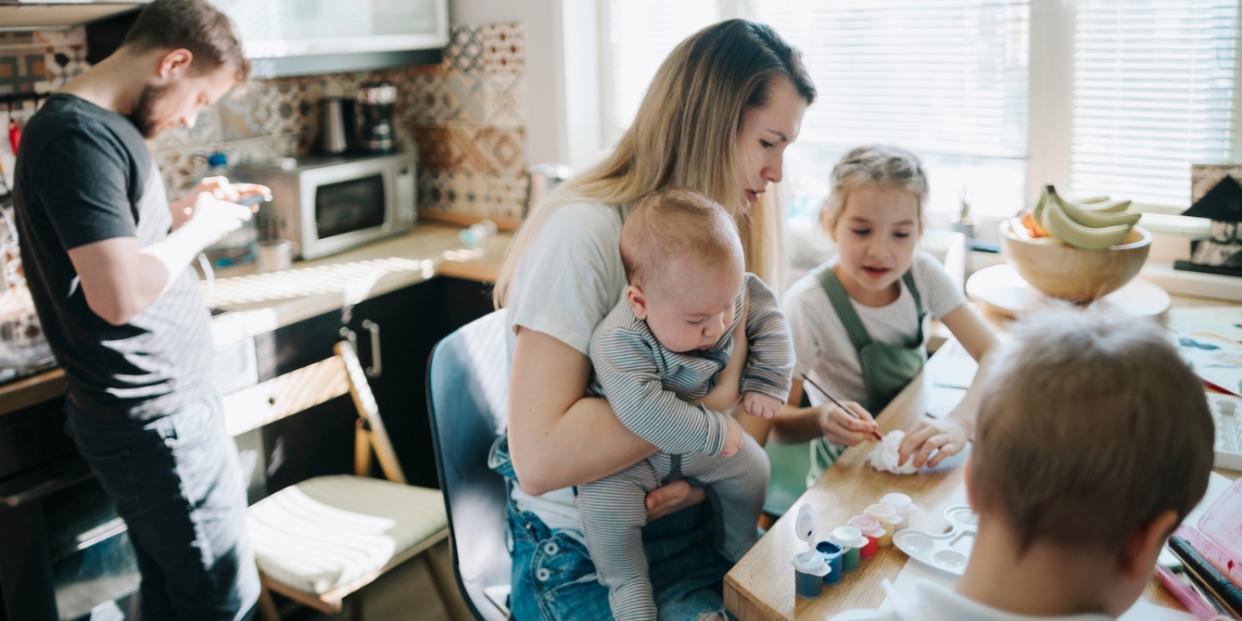We are mothering within ‘patriarchal motherhood’

It’s a big statement, I realize, to say that motherhood is oppressive. Yet, through the lens of “patriarchal motherhood”, as theorized by maternal scholars like Adrienne Rich and Andrea O’Reilly, PhD, it is—and has been for generations of mothers. And the data supports this: With the rates of burnout increasing and maternal mental health challenges on the rise, it’s clear that mothers are struggling.
And yes, we can blame the patriarchy. The specific type of patriarchy that applies to motherhood. Patriarchal motherhood refers to the systems, values and ideologies that underpin the oppressive nature of Motherhood (capitalized here to represent the “institution” of motherhood). These are the norms or “rules” we live by based on our unspoken and oftentimes unconscious agreements that run the systems, institutions and greater culture in which we mother.
So how might patriarchal motherhood actually be impacting you as a mother?
In my work as a therapist and matrescence researcher, I have come to believe that mothers need words to describe their experiences. Without these words, they often feel alone and ashamed of their inadequacy. Whereas, when they have words to describe their experiences, they can begin to externalize these assumptions and work toward seeing that there is nothing wrong with them—and indeed it is a larger systemic issue. If we can begin to name where the pressures and expectations come from, then we can begin to feel less caught up in them.
Dr. O’Reilly posits that there are 10 ideological assumptions that cause mothering to be oppressive to women. I have selected a handful that have the biggest impact on mothers today. Have a read through these concepts within patriarchal motherhood and see if you can identify with any in particular.
These include:
Essentialization: This concept signifies that becoming a mother is the most significant aspect of a woman’s life and identity.
Individualization: This suggests that the work of mothering is the responsibility of one singular person—the mother.
Naturalization: This concept assumes that mothering comes naturally to women—they should instinctively “know” how to do it.
Expertization and intensification of motherhood: These concepts refer to the “intensive mothering” ideology outlined by sociologist Sharon Hays and suggest that mothers should rely on experts for all their decision-making and consumer practices.
Depoliticization: The belief that the work of mothering is a private ordeal and should not be served by any political agenda.
Biologicalization: The theory that the birth mother is the “real” and best mother.
Have you ever asked yourself “Why is this so hard?” or “Why am I struggling? I thought this would come naturally to me!” Or maybe you’ve felt all-consumed by social media and a sea of experts giving you contradictory advice. Maybe you’ve experienced denying other aspects of yourself as you believe that a “good mother” should give all of herself to her children and be available to them 24/7.
Whether you see yourself reflected in these assumptions, the reality is that these compose our current motherhood culture and yes, you are mothering within them.
So what now? I don’t want you to see only despair and hopelessness.
It’s very much worth recognizing and celebrating the fact that mothering can be empowering.
While we need to continue to advocate for systemic and political change—think affordable and accessible childcare, paid family leave, equitable and accessible maternal health care—we also need to collectively be working towards cultural change. This can feel daunting and vague. But it’s doable.
Creating a more mother-centric motherhood
Here’s where to start: By collectively coming together and sharing in this mission (and this will look different for each of us!).
When one mother decides to no longer “agree” to the current terms of motherhood, she does so for all the mothers.
Give yourself permission
We “give permission” to one another when we do something for ourselves—the concept that it makes it OK for me to do it, because you did it too. So the next time you feel hesitant to take time for yourself, do it for me—do it for all the mothers.
Seek out role models
We need role models—to hear the stories of other mothers who are already doing it differently—who are empowered in their mothering experience. We can learn a lot from other cultures too—our Western way of mothering is not the only way.
Aim for gentle accountability
We need gentle accountability—checking in on one another, showing up to support one another in making these changes and celebrating when it happens. (It can feel risky and scary to do something so countercultural!)
Offer honest reflections
We need more honest reflections of our experiences—too many mothers suffer in silence thinking they are “bad moms” for believing that motherhood is hard. Start to take off your mask and show up authentically and vulnerably when you feel safe too, with those you trust. You’ll be surprised how relieved you’ll feel when another mother says she feels the same.
Mothers need other mothers to do the work of detangling themselves from the patriarchy. This is why groups can be so powerful for mothers. Until we return to our roots and live and mother in real community with one another (as we are biologically designed to do), we need these intentional and organized spaces to come together. We are each other’s strongest source of empowerment and one another’s medicine. Together we can be the change mothers need and deserve.

